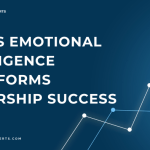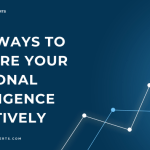Table of Contents
- Introduction
- Understanding Emotional Intelligence
- 1. Improved Communication
- 2. Better Conflict Resolution
- 3. Enhanced Empathy
- 4. Strengthened Trust
- 5. Increased Relationship Satisfaction
- Conclusion
- FAQs
Introduction
Emotional intelligence (EI) is a vital skill for navigating the complexities of human relationships. It refers to the ability to recognize, understand, and manage our own emotions while also being attuned to the emotions of others. In a world where effective communication and deep connections are more important than ever, emotional intelligence can be the key to strengthening your relationships—be it romantic, familial, or platonic. In this article, we explore five ways emotional intelligence enhances your relationships.
Understanding Emotional Intelligence
Before diving into how emotional intelligence can improve your relationships, let’s take a moment to define it. According to Daniel Goleman, a pioneer in emotional intelligence research, EI encompasses five key components: self-awareness, self-regulation, motivation, empathy, and social skills. These elements enable individuals to navigate social complexities and manage personal interactions more effectively.
For a deeper dive into the science of emotional intelligence, check out this article from Psychology Today.
1. Improved Communication
Effective communication is the cornerstone of any strong relationship. Emotional intelligence plays a crucial role in enhancing your communication skills.
- Active Listening: Emotionally intelligent individuals are better listeners. They can pick up on verbal and non-verbal cues, allowing them to understand the speaker’s emotions more deeply. This means they can respond more thoughtfully rather than reactively, leading to richer conversations.
- Expressing Emotions: Those with high emotional intelligence are more adept at expressing their feelings. They can articulate their emotions clearly, which helps avoid misunderstandings and fosters openness.
- Feedback: Emotionally intelligent people know how to give and receive feedback constructively. They appreciate input from others and can express their thoughts without alienating anyone.
Table: Key Aspects of Improved Communication
| Aspect | Emotionally Intelligent Individuals | Others |
|---|---|---|
| Listening Skills | Excellent active listeners | Often distracted |
| Expression of Emotions | Articulate and clear | Vague and misunderstood |
| Feedback | Constructive and empathetic | Defensive and critical |
“Emotionally intelligent communication is not just about speaking; it’s about listening and understanding.”
2. Better Conflict Resolution
Conflicts are inevitable in any relationship, but how you handle them can make or break your connection. Emotional intelligence equips you with the tools to navigate conflicts more effectively.
- Emotional Regulation: Individuals with high EI can manage their emotions during conflicts. They remain calm and composed, allowing for rational discussions rather than heated arguments.
- Understanding Perspectives: EI fosters an understanding of different viewpoints. By recognizing the emotions behind someone else’s perspective, you can work towards a solution that satisfies both parties.
- Collaborative Solutions: Emotionally intelligent individuals are more likely to seek win-win solutions. They focus on resolving the issue at hand rather than winning the argument.
“Conflict is not the enemy of intimacy, but its catalyst.”
3. Enhanced Empathy
Empathy is a critical component of emotional intelligence that can significantly deepen your relationships.
- Recognizing Emotions: Being able to identify the emotions of others helps you respond appropriately. For example, if a friend is feeling down, you can offer support instead of brushing off their feelings.
- Connecting on a Deeper Level: Empathy allows you to connect with others on a more profound level. This connection can lead to a sense of belonging and understanding, making relationships more meaningful.
- Supporting Others: When you have empathy, you’re more likely to support your loved ones through tough times, leading to stronger bonds and increased trust.
“Empathy is the bridge that connects us to others in their times of need.”
4. Strengthened Trust
Trust is the foundation of any successful relationship. Emotional intelligence can contribute significantly to building and maintaining that trust.
- Transparency: Emotionally intelligent individuals tend to be more open and honest in their communications, which fosters trust. When people feel they can rely on you, they are more likely to open up in return.
- Consistency: High EI often correlates with consistent behavior. When your actions align with your words, it builds a sense of security and trustworthiness.
- Handling Vulnerability: Emotionally intelligent individuals are more comfortable with vulnerability. They can express their feelings and fears without fear of judgment, which encourages others to do the same.
“Trust is built on the foundation of transparency and vulnerability.”
5. Increased Relationship Satisfaction
When emotional intelligence is nurtured in relationships, overall satisfaction improves for both parties involved.
- Mutual Understanding: High emotional intelligence leads to better understanding and appreciation of each other’s needs and desires, fostering a sense of partnership.
- Reduced Stress: Relationships characterized by emotional intelligence often experience less stress and conflict, which contributes to overall happiness. For more strategies on reducing stress, check out our article on 10 Proven Stress Management Techniques for Daily Relief.
- Long-lasting Bonds: When both partners exhibit emotional intelligence, they are more likely to maintain a healthy, fulfilling relationship over the long term.
“Relationship satisfaction flourishes in the soil of understanding and empathy.”
Conclusion
Emotional intelligence is not just a buzzword; it’s a powerful tool that can transform relationships for the better. By enhancing communication, improving conflict resolution, fostering empathy, strengthening trust, and increasing overall satisfaction, EI lays the groundwork for deeper, more meaningful connections. Whether you’re looking to improve your romantic relationship, strengthen family ties, or forge lasting friendships, investing in your emotional intelligence is a step worth taking.
FAQs
1. Can emotional intelligence be developed?
Yes, emotional intelligence can be cultivated through practice and self-reflection. Engaging in activities like journaling, mindfulness, and seeking feedback can enhance your EI. For practical techniques, refer to our article on 10 Effective Emotional Regulation Techniques for Daily Life.
2. How does emotional intelligence differ from IQ?
Emotional intelligence focuses on understanding and managing emotions, while IQ measures cognitive abilities. Both are important, but EI is often more critical for success in relationships.
3. Are there any resources to learn more about emotional intelligence?
Absolutely! For a comprehensive guide, check out Emotional Intelligence 2.0 by Travis Bradberry and Jean Greaves, which offers practical strategies for enhancing emotional intelligence.
4. How can I assess my emotional intelligence?
Many online assessments can help you gauge your emotional intelligence. Websites like Mind Tools offer resources and self-assessment tools.
“By implementing the principles of emotional intelligence in your relationships, you can pave the way for meaningful connections that stand the test of time.”
Also, explore more on how positive thinking can impact relationships in our article 10 Ways Positive Thinking Transforms Your Relationships.




